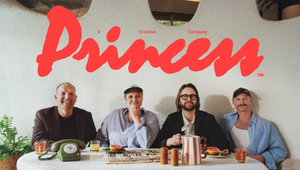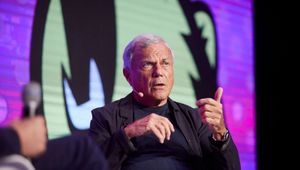
Why For ITV, “Creativity Is the Core of Success”

As group commercial director of ITV, Simon ‘Dags’ Daglish is convinced of the business power of creativity. “We're a TV company at the end of the day,” he says, “which is all about creating entertainment for our customers. Whether it is a documentary, a drama, comedy or reality show, a 30-second ad, a 10-second ident or an integration into a show – all of those things rely on creativity to create engagement between our audience and whatever it is we're putting out.”
But even if he wasn’t running the commercial arm of a broadcaster, he’d be obsessed by ideas. “Creativity is the core of any success,” he asserts. “Creativity is all about ideas. And ideas solve problems. Ideas create opportunities. If we stop having ideas, we become very monochrome, following a very direct path, which will lead to the same outcomes.
That’s why in 2023 he had dozens of his team take part in The Business of Creativity course. Led by Sir John Hegarty (creative founder at Saatchi & Saatchi and BBH) the eight-week course aims to equip you with tangible tools to help you win through the application of creativity. Dags wanted his team to take the course, “to remind them of and re-engage them with the value of creativity in a world which is dominated by data.”
As a business leader driven by concrete figures, data analysis and insights isn’t something Dags dismisses, but he stresses that nuance is needed. “We forget that behind every single piece of data, there is a human,” he says. “I wanted to remind everybody here that ideas are the things that drive businesses and engagement.”
Understanding the humans that ITV reaches is core to Dags’ beliefs on successful business practices. “Great creative thinkers have a really intuitive understanding of who their consumer is. And intuitive sounds like you're born with it – you're not. You have to adopt an attitude and a way of living to be able to have that intuition.” He often tells his team that if they want to understand their audience they should go and sit in a motorway service station. “Just observe what they do, who they are, why they are. That will give you a better insight than reading any manual.”
Dags was exposed to great creative thinking from a young age. His father ran a poster company, More O’Ferrall, and he still has an ad it once ran in Campaign magazine. The line was ‘Long Live the Mad Art Director’ and it showed four poster sites using outdoor advertising in radical new ways; from an apparent car crash advertising tires to a bottle of plant fertiliser looking like it had spilled and nourished a tree. As a young boy, Dags loved these clever ideas.
Another inspiration from his dad came when Dags was about 12, in an effort by Adshel to promote its six sheet billboards for the first time. “Lots of people said, you can't be creative on a six sheet,” says Dags. So his father took a photo of Dags’ little three-year-old sister and he wrote it on it in a child's writing: “My name is Amy. I like slugs and snails.” That went on thousands of posters around the UK. “Because it had nothing else on it than that, it created a huge conversation: Who is Amy? My little sister ended up being on breakfast TV,” he remembers. With no explanation, the country speculated wildly. “I remember looking at that and thinking that was just such a simple idea that created an absolute storm. And that's stuck with me all my life – simple ideas can create enormous impact regardless of the medium.”
Despite being a salesman and commercial manager all of his career, Dags knows that creativity should be encouraged in all roles within business, not just the ones who are allowed to wear the creativity label. “I think certainly at the idea stage, a ‘non-creative’ such as me can have input,” he says. He’s done it himself at ITV.
When Simon Gunning, CEO of the Campaign Against Living Miserably (CALM) came to meet Dags at ITV, he told him that 84 men take their own lives every week in the UK. He showed Dags a poster with 84 silhouettes on it, which made an impact on the ITV commercial boss. It got him thinking though, and Dags suggested to the CALM CEO that ITV’s studios would be the ideal medium on which to convey this idea, with 84 statues on top. This became ‘Project 84’ which commissioned renowned sculptor Mark Jenkins, with support from bereaved friends and families who have lost a loved one to suicide. Across a series of workshops, the relatives were guided in Mark’s signature tape casting technique, each producing a sculpture for the installation.
“I didn't do the execution, I didn't have the original thought. But I was able to put something into that though,” says Dags. “I think that's the wonderful thing about creativity – an idea can be built on using a construct that has lots of people feeding into it to deliver the final thing. Anybody who works in advertising can do that. And it doesn't matter whether you're selling space or you're creating the entertainment that goes into space – you can do that.”
It’s a truism that everybody is creative. But Dags knows that people need tools to be able to put the ideas they have into useful places. For him, the final module of The Business of Creativity, ‘Living the Creative Life’ was the “crystallisation” of the course. “Just telling people they're creative is helpful to an extent, but it's meaningless because lots of people need help on how to bring that to the fore,” he says. “At the end of the course it's really good instruction into how to take everything that you've seen and heard on the course and use it in your everyday life. And I think that's really key. It makes it incredibly practical and helpful.”
For Dags, the business imperative of putting his team on the course was clear: “I wanted to pull everybody away and give them more of a helicopter view of what they could achieve here ITV and the importance of emotionally connecting with the consumer.”
It appears to have had an impact. “ITV has been challenged over the years and was challenged again last year,” says Dags. “However, we had the biggest year for what we call partnerships, sponsorships and entertainment integration – which is all about generating ideas. That's the biggest year financially in ITV's 67-year history with an audience which is a third of the size it was 10 years ago. And yet the team came up with so many different ideas for customers and clients, they managed to get them to spend more money than they have in the history of ITV.
“John did his course at the beginning of last year. By the end of last year, we'd broken the record,” Dags adds. “And I think that was not entirely down to John because I don't want him to come back to me for commission, but it certainly had an effect in making everybody believe that they can have ideas that make a difference to people's businesses. And I hope to carry that through to this year.”
The Business of Creativity spring cohort launches April 29th 2024. Find out more about the course here.















